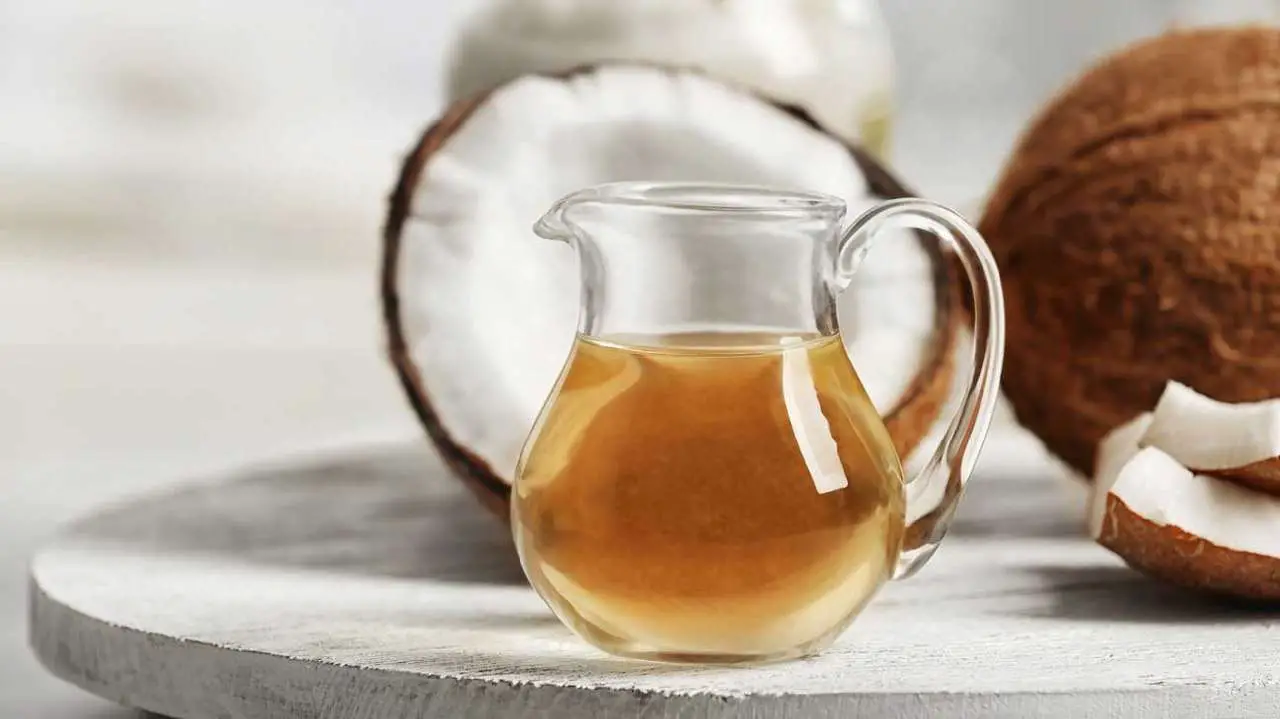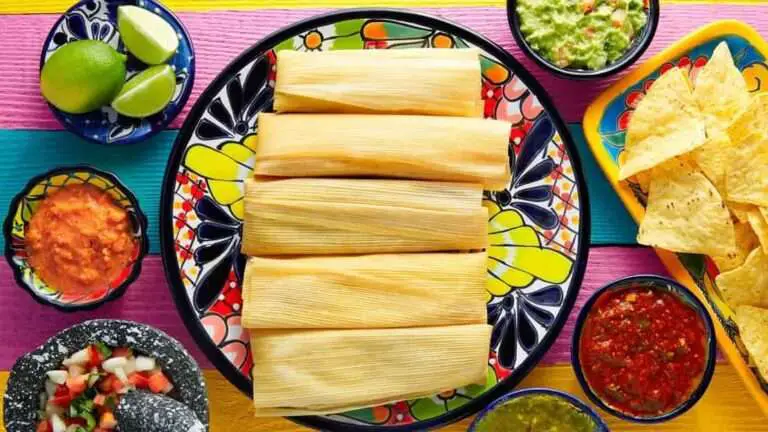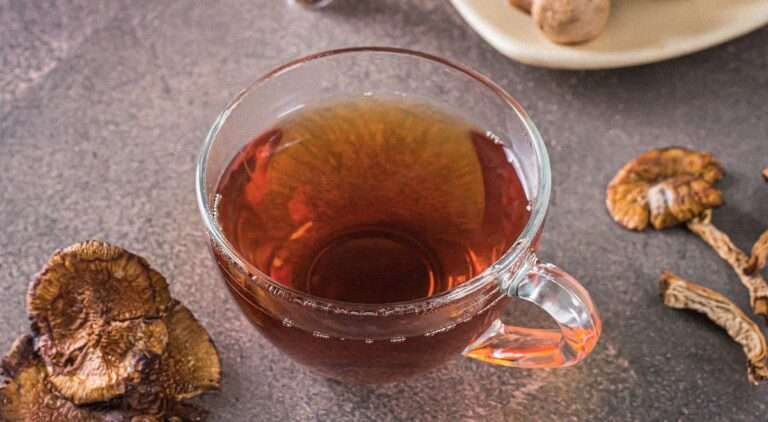How is Mct Oil Made?
MCT oil is made by extracting medium-chain triglycerides from coconut or palm kernel oil. Fractionation, through fractioning by boiling point separation, helps efficiently extract pure substances.
Exploring the world of health supplements, MCT (Medium Chain Triglyceride) Oil stands out for its energy-boosting properties and support in ketogenic diets. Derived mainly from coconut or, less frequently, from palm kernel oil, its production involves separating the medium-chain fats from the rest of the oil.
How is Mct Oil Made? The resulting MCT oil is a colorless, odorless liquid at room temperature and has gained popularity for its ease of digestion and quick conversion to energy. Athletes and those following a low-carb lifestyle often incorporate MCT oil into their diets for its benefits. Its versatility also makes it ideal for adding to coffee, smoothies, or even salad dressings without altering the taste. With its rising demand, understanding the making of MCT oil is key for consumers seeking a quality energy source in their nutrition regimen.
Introduction To Mct Oil
MCT oil stands as a powerhouse in the health and wellness sector. Gained traction among fitness enthusiasts, MCT oil emerges from fats known as medium-chain triglycerides. This oil promises energy boosts and weight management support.
Origins And Popularity
The roots of MCT oil link back to coconut oil, popular in tropical regions. It has soared in demand within keto diets. Proponents prize it for its rapid energy release. This surge in popularity stems from its metabolic benefits.
Recent trends see MCT oil embraced in bulletproof coffee. It also shines in sports nutrition. Celebrities and athletes often spotlight its virtues, attracting a broader audience.
Primary Sources
MCT oil finds its essence primarily in coconuts and palm kernels. Over 50% of the fats in these sources can be MCTs. Dairy products also supply smaller MCT quantities. Yet, sources like lactose-free butter cater to various dietary needs.
The table below illustrates common MCT sources:
| Source | MCT Content |
|---|---|
| Coconut Oil | Up to 55% |
| Palm Kernel Oil | About 54% |
| Dairy Products | Varies |
Each source undergoes a fractionation process. This extracts the concentrated MCTs. Then, specific methods like distillation refine the oil for purity. Finally, the result is a versatile, odorless, and tasteless MCT oil.
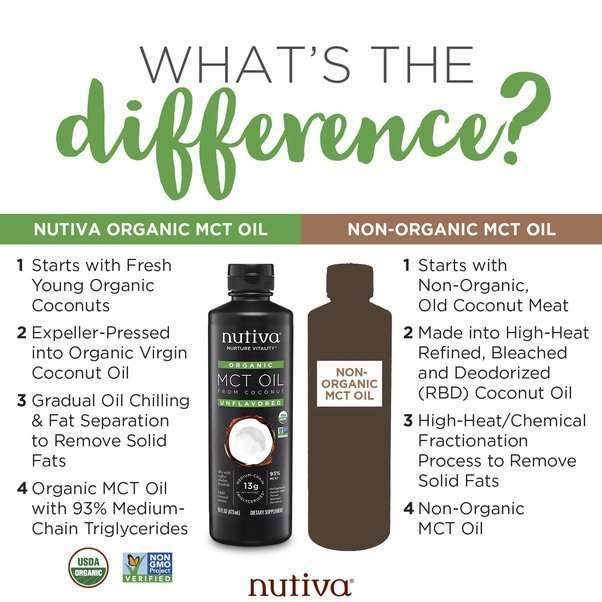
Extraction Of Medium-chain Triglycerides
Medium-Chain Triglycerides (MCTs) are unique fats. They provide quick energy. Many love them in ketogenic diets. We get them from certain oils like coconut or palm. But how do we extract these powerful MCTs? It’s all about the right process and techniques.
Fractionated Distillation Process
The fractionated distillation process is a key method. It separates different types of fats based on their melting points. Imagine it as a smart system that picks only the MCTs. It discards the rest.
- Heating: We begin by heating the oil. This turns all the fats into vapors.
- Cooling: Then we cool them. During cooling, different fats condense at different temperatures.
- Collection: We collect only the desired MCTs. It’s like separating milk from a latte.
Lipase Enzyme Hydrolysis
Another method is using lipase enzyme hydrolysis. It’s like using a smart scissor. It snips the fat molecules. Only MCTs get selected.
- The enzyme targets the oil’s fats.
- It then breaks down only the desired MCTs.
- These MCTs are then separated and purified for use.
From Coconut To Oil: The Journey
Welcome to the fascinating world of MCT Oil.
Let’s embark on a journey from the lush tropical groves to your bottle of pure MCT Oil.
Harvesting And Selection
The process begins with the meticulous harvesting of coconuts.
Farmers select the ripest coconuts, rich in healthy fats.
- Careful picking ensures premium quality.
- Natural techniques
- Important for final oil purity.
Drying And Processing Of Coconuts
The next crucial step involves drying the coconut meat.
Proper drying locks in the nutrients.
| Step | Process |
|---|---|
| 1 | Split coconuts in half |
| 2 | Remove coconut meat |
| 3 | Hot-air drying technique |
| 4 | Press oil from the dried meat |
Every step preserves the oil’s integrity.
This careful processing results in pure MCT Oil, recognized for its numerous health benefits.
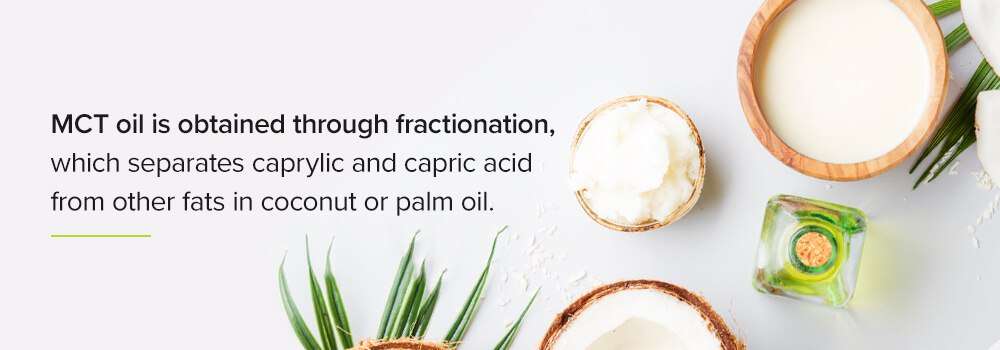
Refining Process
The Refining Process of MCT oil transforms pure coconut or palm oils into the high-performance fats lauded in health circles. This meticulous system strips away impurities while concentrating the medium-chain triglycerides. The result: a potent, digestion-friendly supplement, perfect for ketogenic diets and energy boosts.
Purification Steps
The purification journey begins with a deep cleanse. Here’s how:
- Heating: Warming the oil separates fats by melting points.
- Filtration: Debris exits, leaving only clear oil behind.
- Washing: A water cleanse removes any remaining impurities.
Achieving High Concentration
The focus now shifts to enriching MCT levels:
- Fractional Distillation: Heat sorts MCTs from other components.
- Molecular Distillation: A precise vacuum process captures the purest MCTs.
| Process | Purpose | Outcome |
|---|---|---|
| Fractional Distillation | Separation based on boiling points | Refined MCT oil with fewer long-chain fats |
| Molecular Distillation | Enhanced purity under vacuum | Maximum MCT concentration |
These crucial steps yield a highly concentrated MCT oil, offering maximum health benefits.
Benefits And Uses Of Mct Oil
People love MCT oil for its health perks and versatility. MCT stands for Medium-Chain Triglycerides. These fats are easy for your body to break down. They come from coconut oil and palm kernel oil mostly. Users say MCT oil gives them more energy and helps with weight management. Let’s explore its amazing benefits and how it pops up in everyday products.
Dietary And Health Advantages
The health benefits of MCT oil are impressive:
- Quick energy – Your body makes energy from it fast!
- Better brain function – It can help your brain stay sharp.
- Supports weight loss – It may make you feel full and up your metabolism.
- Easy digestion – MCT oil doesn’t need bile salts to digest. People with digestive problems find it helpful.
Applications In Food And Pharmaceuticals
MCT oil is super versatile. Here are some ways it’s used:
- Cooking – People use it like other oils for low heat cooking.
- Coffee booster – Blending it in coffee is a popular trend.
- Supplements – It’s often in dietary capsules.
- Pharmaceuticals – MCT oil helps make medicines that are easier on the stomach.
Quality Control And Safety Measures
Understanding the ‘Quality Control and Safety Measures’ in the creation of MCT oil is crucial. Manufacturers must follow strict protocols to produce a safe and effective product. Let’s dive into the steps that ensure the quality and safety of MCT Oil are never compromised.
Industry Standards
When it comes to MCT oil production, industry standards play a pivotal role. These standards ensure that every bottle of MCT oil reaching consumers is pure, safe, and of the highest quality. Adopting such measures prevents contamination and maintains the oil’s beneficial properties. Let’s explore the key standards shaping quality MCT oil creation.
- Good Manufacturing Practices (GMP): Factories must comply with GMP to assure proper design, monitoring, and control.
- ISO Certification: This international standard specifies requirements for a quality management system.
- Third-party Testing: Independent labs verify product consistency and safety.
Consumer Guidance On Mct Oil
Customers seeking the benefits of MCT oil should also be aware of the aspects that signify a quality product. Guidance for consumers touches on labels, certifications, and recommended usage. Here we provide some advice to help choose the best MCT oil.
| Label Check | Origin | Certifications | Usage |
|---|---|---|---|
| Look for clear, informative labels. | Ensure the oil is sourced responsibly. | Seek out organic or non-GMO certifications. | Start with small doses and adjust as needed. |

Frequently Asked Questions For How Is Mct Oil Made?
Is Mct Oil Highly Processed?
Yes, MCT oil is typically highly processed to isolate medium-chain triglycerides from coconut or palm kernel oil.
Is Mct Healthier Than Coconut Oil?
MCT oil is a concentrated source of medium-chain triglycerides and is digested more easily than coconut oil. It may provide quicker energy and is less likely to be stored as fat, making it a potentially healthier choice for some individuals seeking specific health benefits.
How Do You Make Mct Oil Naturally?
MCT oil is made by extracting medium-chain triglycerides from coconut or palm kernel oil. Producers use fractionation to separate MCTs from the longer-chain fats.
Is It Ok To Take Mct Oil Everyday?
Yes, taking MCT oil daily is generally safe for most people as a dietary supplement, but it’s important to follow the recommended dosage and consult with a healthcare professional.
Conclusion
Understanding the process behind MCT oil production can enhance your appreciation for this versatile supplement. From the selection of quality coconuts to the meticulous fractionation process, MCT oil’s journey to your pantry is steeped in careful science and engineering. Embrace the benefits of MCT oil in your diet, knowing the effort and purity that defines its creation.


